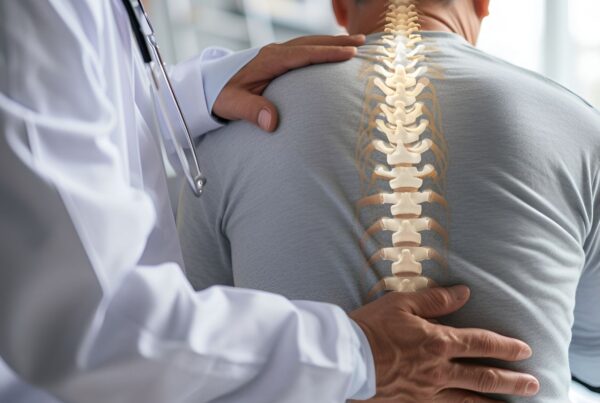What to Expect and How to Overcome Them
Spinal fusion surgery can be a significant step toward relieving pain and restoring quality of life. While this procedure has helped countless patients return to their daily activities, understanding potential post-spinal fusion problems is crucial for setting realistic expectations and ensuring optimal recovery.
Understanding Common Postoperative Issues for Spinal Fusion
Pain and Discomfort
Post-operative pain is a natural part of the recovery process after spinal fusion surgery. Initially, you may experience significant discomfort around the surgical site, which usually peaks in the first few days following the procedure. This pain gradually subsides as your body heals, though the timeline varies from person to person. Your surgical team will work with you to develop an effective pain management strategy, which might include prescribed medications and proper positioning techniques.
Muscle Stiffness
Following surgery, the muscles surrounding your spine may feel unusually stiff. The sensations of stiffness and spasm result from the muscle dissection required for surgery, the decreased motion due to incisional pain, and changes in your usual movement patterns. Your back muscles need time to adjust and heal. Physical therapy is crucial during this phase, helping you safely rebuild strength and flexibility while respecting the healing process.
Fatigue
Don’t be surprised if you feel unusually tired during your recovery period. Having undergone general anesthesia causes a certain degree of deconditioning. Also, your body is directing significant energy toward healing the surgical site and rebuilding bone. This fatigue is completely normal and typically improves gradually over several weeks. During this time, it’s essential to balance rest with appropriate activity levels as recommended by your healthcare team.
Nerve Irritation
Some patients experience temporary nerve-related symptoms like numbness, tingling, or radiating pain in their extremities. These sensations may result from post-op swelling or the nerves adjusting to their new surroundings. In most cases, these symptoms resolve within a few weeks as inflammation subsides and healing progresses.
Long-Term Considerations
Limited Mobility
While spinal fusion is intended to eliminate movement of the fused spinal segments, many patients find that their overall mobility actually improves once they’ve recovered. This improvement occurs because they’re no longer limited by the severe pain that necessitated surgery in the first place. Your physical therapist will work with you to maximize mobility and help you maintain an active lifestyle.
Adjacent Segment Disease
Adjacent segment disease occurs when the spinal segments above or below your fusion experience increased stress, potentially leading to accelerated wear and tear. While this condition can develop over time, it’s relatively uncommon. Your surgical team will discuss preventive measures and exercises that can help minimize this risk.
It's time to get back
to doing what you love.
Some of the most common questions patients ask include, “Can I damage my spinal fusion?” or “Can you break a spinal fusion?” The answer is yes. While spinal fusion creates a solid bond between vertebrae, the fusion can be compromised, especially during the critical healing period. However, by following proper preventive measures and management strategies, you can significantly reduce the risk of complications and ensure successful long-term outcomes.
Pre-Surgical Preparation
Success in spinal fusion surgery often begins before the procedure itself. Your medical team will assess and optimize your health, maximize your bone strength, and optimize your physical capabilities through Physical Therapy (if your pain allows).
Post-Surgical Care
Adhering to post-operative guidelines is critical for successful healing. This includes:
- Following proper body mechanics when moving
- Maintaining good posture
- Avoiding excessive bending, twisting, or lifting
- Attending all scheduled physical therapy sessions
- Taking prescribed medications as directed
- Maintaining a balanced diet
- Avoid use of nicotine products
Lifestyle Modifications
Your lifestyle choices can significantly impact your recovery success. Maintaining a healthy diet rich in nutrients supports healing, while smoking can seriously impair fusion rates and overall recovery. Regular, appropriate exercise as cleared by your healthcare team helps maintain strength and flexibility in your spine.
While successful outcomes are the norm, some patients may require revision surgery. Revision spinal surgery is performed to correct or improve outcomes from a previous spinal procedure. Given the complexity of the spine, patients may require additional intervention, both non-surgical and surgical. Depending on the symptoms and the impact on a patient’s quality of life, revision surgery may be recommended. This might be necessary if:
- The initial fusion fails to heal properly (pseudoarthrosis)
- Hardware complications develop
- Adjacent segment disease becomes symptomatic
- Persistent pain continues despite appropriate conservative treatment
Being aware of potential warning signs helps ensure timely intervention if needed. Contact your surgeon if you experience:
- New or worsening pain patterns
- Unusual sounds or sensations around the surgical site
- Increasing numbness, weakness, gait instability, or bladder/bowel issues
- Signs of infection, such as fever or increased wound drainage
You may wonder, “What happens if you fall after spinal fusion?” Your response will depend on both when the fall occurs and its severity. During the initial healing period (the first 3-4 months), your fusion is still consolidating and is more vulnerable to disruption. Be sure to speak with your doctor.
While complications after spinal fusion surgery can occur, they’re generally manageable with proper medical attention and patient compliance. The key to successful recovery lies in maintaining open communication with your healthcare team, following prescribed protocols, and staying committed to your rehabilitation program.
The team at Neurosurgeons of New Jersey understands that every patient’s journey is unique. Our team of experienced spine experts provides individualized attention and support throughout your recovery process, ensuring you have access to optimal care when you need it most. Our spine surgeons are nationally recognized leaders, affiliated with prestigious, academic institutions such as New York University. We combine the advanced expertise of fellowship-trained surgeons with the warmth and accessibility of a neighborhood practice, offering both excellence in surgical care and the convenience and compassion of your suburban doctor.
Remember to focus on your progress and celebrate the small victories along the way to full recovery. With the right surgical team and proper post-operative care, you can maximize your chances of a successful outcome.

About Ridgewood
Our team of board certified physicians, located in Ridgewood, New Jersey, are dedicated to bringing you the latest developments and treatment options for spinal surgery. We strive to produce the most clarified & clear content to help you make informed decisions on your medical journey. The road to feeling like your true self should not feel lonely- Let us help you. Please call us to schedule a consultation and speak to one of our team members.
Recent Posts:






